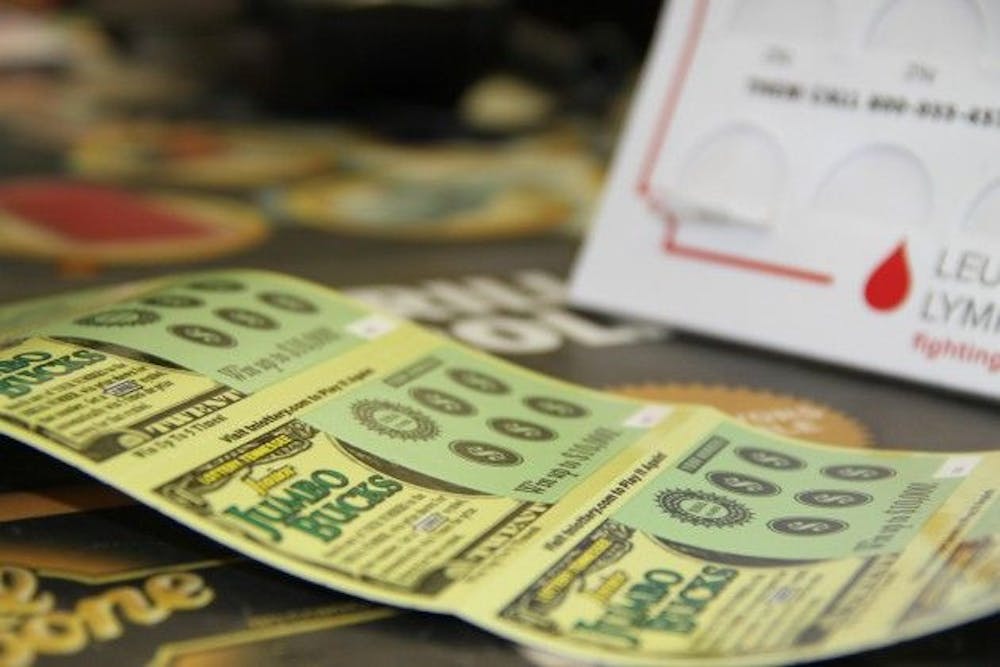Jeanie Mahannah's luck couldn't get much better after winning $200,000 on a scratch-off ticket-except for when she won $50,000 on the very next ticket she bought. That was four years ago, and now all that's left of it is a meager account set up by her son that allows her to only draw a set amount each month.
Mahannah didn't have a lot of money before she won, but she was buying cigarettes and lottery tickets on a daily basis, praying to God that she would hit it big.
"When I won the $200,000, I just had to buy one more, and lo and behold, I snagged another $50,000 just like that," Mahannah said.
Now that she had more money, she bought more scratch-off tickets hoping to hit it big again. Losing lottery tickets could be found spilling out of every crevice and compartment in her car and all throughout the new little home she purchased in Millington, Tenn. After a home makeover, an all-expenses-paid family vacation and a sea of scratch-offs were purchased, the money was soon gone, and she was back to square one.
"God blessed me with money, and if he blesses me I'm gonna swim in those blessings," Mahannah said. "If God wants me to have money again, he'll give me money."
State lotteries bring in large sums of money for most states in the U. S. In 2008, the total sum of money brought in by all the states amounted to $77.3 billion, according to the U.S. Census Bureau. Many of these states use a portion of this money to create scholarships for students.
Tennessee's state lotteries bring in enough money to fund the HOPE State Lottery scholarship. This scholarship awards eligible students $2,000 a semester for those who scored at least a 21 on the ACT and have a weighted GPA of 3.0.
Even though these lottery scholarships have done a lot for students, they have not gone without receiving criticism. In a nationwide study, the top 20 percent of lottery players who spend the most money on tickets are twice as likely to have dropped out of high school and make less than $10,000 a year as the rest of the nation, according to a study at Duke University, but 47 percent of the recipients of the Tennessee HOPE Lottery Scholarship come from families who make over $72,000 annually, according to the Tennessee Higher Education Commission.
Moreover, there have been several studies that have shown that there has recently been an increase in the number of younger people buying lotto tickets. Some of these people using lotto tickets are even under the legal gambling age.
"(The) receipt of scratch lottery tickets as gifts during childhood or adolescence was associated with risky/problematic gambling and with gambling-related attitudes, behaviors and views, suggesting greater gambling acceptability," according to a 2012 study by Yale University.
For some people, lotto tickets are seen not as a habit, but more of a regular, inexpensive purchase tacked on to the price of everyday items most people buy like gas.
"I really haven't spent hardly any money on tickets, because I just get the one or two dollar scratch-offs when I'm buying gas or beer," Andrew Beck, a 21-year-old musician, said.
Beck, who works for a security agency by day and plays bass for his band by night, shares a one-bedroom apartment with two friends just outside downtown San Diego, Calif., He has been buying lottery tickets regularly for about two years now, but he has just recently started to play more frequently. Beck said since he's buying the cheap tickets, it doesn't really affect his wallet. To him, it is just the same as someone buying a candy bar or a pack of cigarettes at the convenience store, but unlike the candy bars, sometimes he wins his money back, plus some.
"I'm not one of those people who just throws his paycheck away," Beck said. "If you're smart, you can make a little extra cash, and that's all I'm doing."
He has won $20 on a $1 ticket and some other small wins here and there. He said he plays because he has friends who have won several thousand dollars playing. For the same reason, he said he has also just recently started going to casinos as well. While he hasn't won any money playing the slot machines yet, he said that he has a good feeling about his chances.
Tennessee Sen. Jim Summerville recently proposed a bill that would change the warning on lottery tickets from "Play responsibly" to "You probably won't win." When the bill was proposed, Summerville said that he thought the lottery was corrupt and taking advantage of the poor, which he said, according the Bible, is the most abominable sin. The bill was approved by the committee and now awaits the next step in potentially becoming law.
"I have been selling lotto tickets for years, and I sell them all the time, but I don't see a lot of winners," Yusuf Yusuf, a Memphis gas station owner, said.
The largest amount of money he has ever seen somebody win was from a ticket that won a man $10,000, and that was the largest ticket he has ever sold in all of his years working in a gas station. When people do end up scoring some cash, most of the winners don't hold on to their earnings for long at all, according to Yusuf.
"Even if someone wins $50, $500 or $1,000, they usually just end up giving it right back to buy more tickets," he said.
The gas station owner said that he has been aware of the Summerville bill ever since it was proposed, and he hopes it becomes a new law.
"Our store sells a large amount of tickets, but I don't think it's a good thing," Yusuf said. "There's a lot of money being tossed around, but no one is really winning."




